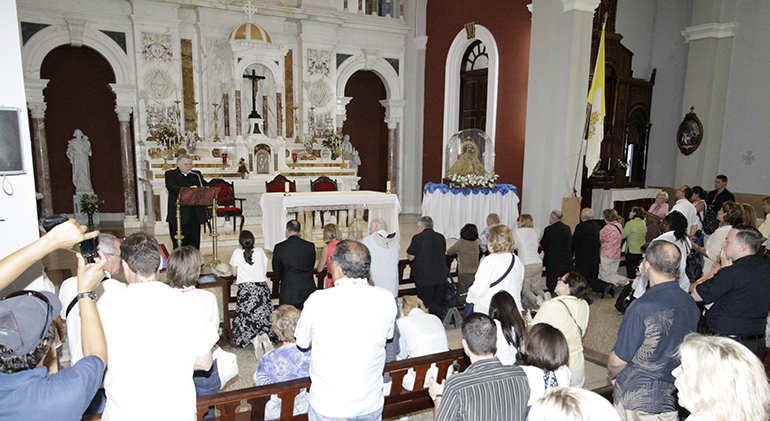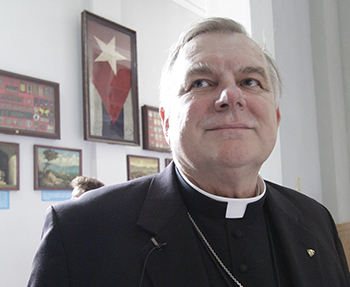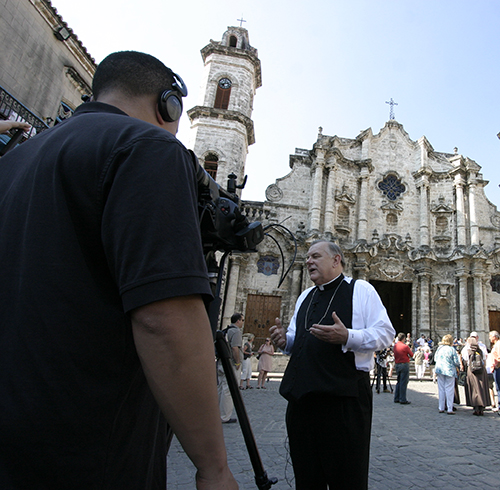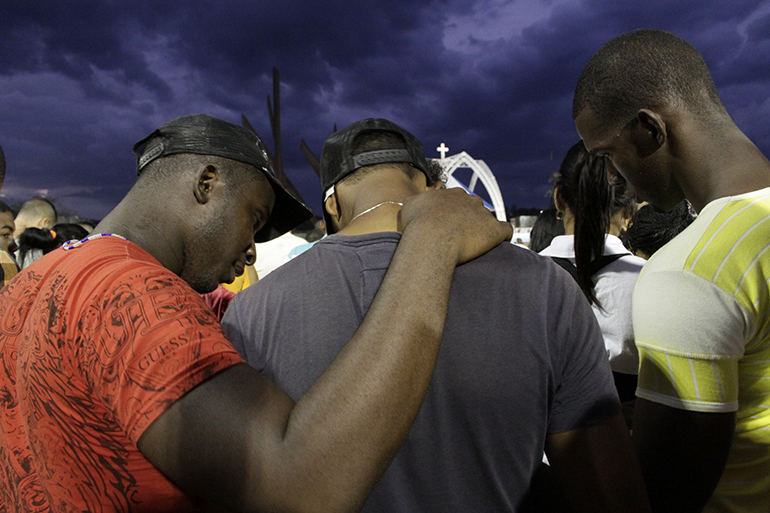By Ana Rodriguez Soto - The Archdiocese of Miami

Photographer: ANA RODRIGUEZ-SOTO | FC
Archbishop Thomas Wenski leads the pilgrims in prayer at the Shrine of Our Lady of Charity in El Cobre, Cuba, in March 2012. He said to invoke Our Lady's intercession for three things: the pilgrims, the U.S., and Cuba. Both the Cuban and U.S. governments welcomed the role played by Pope Francis, through Havana's Cardinal Jaime Ortega, in the dialogue that resulted in today's announcement of an easing of tensions between the two countries.
MIAMI | Cubans in South Florida reacted with both joy and skepticism to the news that Cuba and the United States would start working toward normalizing relations and ending the economic embargo imposed by the U.S. 53 years ago.
“Blessed be God. What a miracle!” said Rosario Bergouignan, a former employee of the Metropolitan Tribunal and one of the “historical exiles” � those who left in the first waves in the 1960s. She first returned to Cuba in 1998, during St. John Paul II’s historic visit to the island.
That visit helped to change Bergouignan’s mind about the effectiveness of the embargo and inspired her to travel back to the island a number of times on humanitarian missions.

Photographer: ANA RODRIGUEZ-SOTO | FC
Framed by a Cuban flag, Archbishop Thomas Wenski looks out to the nave of the Shrine of Our Lady of Charity in El Cobre during the March 2012 pilgrimage to coincide with the visit of Pope Benedict XVI to the island. Pope Benedict's visit, according to some observers, helped solidify the role of the Cuban Church as a trusted intermediary between the governments of Cuba and the U.S.
“What’s the point of having the people suffer for nothing?” she said of the continuation of the embargo, which has not succeeded in toppling Cuba’s communist government.
Both the U.S. and Cuban bishops have maintained that the policy of economic sanctions and non-engagement hurts the Cuban people more than the government leaders who oppress them.
And it was through the intervention of John Paul II’s successor � Pope Francis � that the latest breakthrough in negotiations appears to have occurred.
"Both President Obama and Raul Castro expressed appreciation to the role of Pope Francis in making possible what seems to be a real game changer in the historically strained relationship between Cuba and the United States,” said Archbishop Thomas Wenski in a statement.
He added: “Pope Francis did what popes are supposed to do: Build bridges and promote peace. He acted much like his namesake, Francis of Asissi, who during the fifth crusade, went to Egypt to meet with the Sultan al Kamil in the interest of peace.”
Church played a role
The pope seems to have relied on Havana Cardinal
Jaime Ortega to convey messages between President Barack Obama and Cuban leader
Raúl Castro that resulted in the mutual announcement by the White House and
Castro Dec. 17.
The agreement freed American contractor Alan Gross from a Cuban jail, along with “one of the most important intelligence agents that the United States has ever had in Cuba, and who has been imprisoned for nearly two decades,” in the words of President Obama. In return, the U.S. freed three Cubans who had been jailed in the U.S. for espionage for the past 15 years.
“I do believe in my heart of hearts that we as a Church have played a role in this,” said Father Fernando Hería, pastor of St. Brendan Church in a heavily Cuban-American section of Miami, and himself a native of Cuba who left the island 53 years ago, at the age of 11.
“I think we need to be cautious and not put too much expectations on what is transpiring. These are baby steps � major baby steps � just as were done during the Nixon years with respect to China and ping pong diplomacy,” Father Hería said. “Nixon also took a risk when he negotiated with China.”
Father Hería noted that after John Paul II’s visit to Cuba, bishops and priests from the island began meeting regularly with their counterparts in exile, a process that eventually grew to include lay people on both sides of the Florida Straits � and which has led to much greater understanding between them.
“We are the same people divided by parallel histories,” Father Hería noted. “The Church, I believe, always has tried to play an important and positive role in this.”
He added that the visit of Pope Benedict to Cuba in 2012 � following Cardinal Ortega’s successful negotiations for the release of a large group of jailed Cuban dissidents � gave “even greater momentum” to the Cuban government’s realization that “the Church could be trusted” to act as a middleman.
“As a priest I believe this is a major cautionary good step that hopefully can bring, if the parties so desire, a peaceful transition in opening Cuba to the world as the world opens itself to Cuba,” Father Hería said, quoting the words of John Paul II during his visit to the island.
“Dialogue is good for us on this side, for them on that side, and for the whole of the Cuban people,” he added.
Pain and betrayal
But others were much more skeptical � and hurt by the announcement.
“I am just glad my parents, sister and her husband are not alive to feel the pain, disappointment and betrayal of today,” said Hope Sadowski, an employee in the Archdiocese of Miami’s Office of Schools who left Cuba at age 14, “all by myself.”

Photographer: ANA RODRIGUEZ-SOTO | FC
Archbishop Thomas Wenski is interviewed by the media outside Havana's cathedral during the March 2012 pilgrimage that coincided with Pope Benedict XVI's visit to the island. On Dec. 17, the archbishop praised the role of Pope Francis in the agreement that led to a release of prisoners and a promise for further dialogue between the U.S. and Cuba.
“Let’s ask the family of the four that were killed in the Hermanos al Rescate (Brothers to the Rescue) incident, when they were blown out of the sky, how they feel about those three thugs that will be free in exchange for Alan Gross, who did not kill anyone other than trying to give means for information to the Cuban people,” said Sadowski.
She acknowledged that the embargo has not worked, and that at least now Cuba “won’t be able to use it as an excuse for the miserable life the poor Cuban people are enduring.”
“I do hope it benefits the Cuban people,” she said of the end of the embargo. But she called President Obama na�ve for trusting the Cuban government to keep its word on political or even economic reforms.
“Is the USA going to demand that human rights are respected? Doubt it,” Sadowski said.
“The question is: Is what some have called the ‘internal embargo’ changing as well?” said Father Juan Sosa, Sadowski’s pastor at St. Joseph and himself a Pedro Pan � one of the 14,000 unaccompanied minors who were secretly brought to the United States between 1961 and 1963 through the intervention of the Catholic Church.
Like Father Hería, Father Sosa has taken part in the ongoing dialogue between Cuban priests on and off the island, and has traveled back to the island a number of times. He noted that economics � the end of the embargo � cannot be the only criteria for progress.
“Will this mean a new movement toward democratic elections, new opportunities for better economic development, freedom of speech, open educational opportunities different from those provided only by the state, etc.?” Father Sosa asked.
“Marxism must make room for new beginnings,” he said, and Cuban leaders “must be willing to guide this important transition away from self-interests and always for the common good.”
Dialogue before change
“We heard Castro say that he’s open to discussing all these
things with the U.S. president. So let’s hope that it’s true,” Archbishop
Wenski said in a separate interview with The Florida Catholic. He stressed that “the changes that people want to see
usually come as a result of conversations and negotiations; they’re not usually
pre-conditions of negotiations or conversations.”
The fact that the Cuban and American governments are now talking does not signal “a defeat for those who want to see positive changes in Cuba,” Archbishop Wenski said. In fact, the talks “set the scenario for an engagement that hopefully will lead to those changes.”
Asked how the late Miami Auxiliary Bishop Agustín Román, so beloved by exiles and an exile himself, would have reacted to the news, the archbishop said “cautiously hopeful.”
According to Archbishop Wenski, Bishop Roman understood that the Cuban bishops were opposed to the embargo, and “I don’t think he opposed the Cuban bishops on that.”
What he consistently did was reference “the internal embargo that the Cuban government has on its own people.
“I think Bishop Roman would be very careful to talk about that internal embargo and would be saying, will these changes bring about the lifting of that internal embargo as well? Again, I think that’s what we have to be hopeful for,” Archbishop Wenski said.
“We all should be about wanting a soft landing in Cuba,” he stressed. “Because Cuba is going to change but how is it going to change? It could go the way of chaos or it could go through a soft landing. We should all want a soft landing.”

Photographer: ANA RODRIGUEZ-SOTO | FC
In this March 2012 photo, three young men from Santiago huddle close to follow Pope Benedict's Mass on the booklets distributed by the Cuban Church. The Church played a crucial role in facilitating the Dec. 17 agreement to re-establish diplomatic relations between the U.S. and Cuba.


Comments from readers